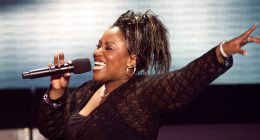
THE FOUR FOUNDERS of Fubu—childhood friends Daymond John, J. Alexander Martin, Keith Perrin and Carlton Brown—never imagined the fashion brand would make it this far. As Mr. Perrin recalls, when the quartet got together in the Hollis neighborhood of Queens in New York to start the label in 1992, “our mindset was we had to make as much money as we can because we don’t know how long this thing is going to last.”
Yet last it has. Fubu (an acronym for “For Us, By Us”) is nearing its 30th year in business, remarkable longevity that’s comparable to that of powerhouse brands like Nike and Ralph Lauren. The founders admit that Fubu’s public profile has faded in the past decade or so. At its peak, around 1999 to 2002, the company was grossing $350 million a year according to its founders. “We were on such a grand scale in the ’90s and early 2000s that anything less than that, I guess, to our audience felt like we went away,” said Mr. Brown during a recent Zoom interview conducted with all four founders.
Over the last few years, the brand has been orchestrating a relaunch the founders hope will appeal to the generation of ’90s babies born after Fubu debuted. The plan has included collaborations with Puma and Urban Outfitters , as well reissues of the sort of baggy logoed gear that was inescapable on MTV and in the pages of XXL magazine through the ‘90s and early 2000s. Most recently, Fubu has relaunched its affordable suiting line in partnership with Karako, a Manhattan tailoring label, and added new licensees in Europe and South Africa.
Some Gen-Z style icons have embraced the revitalized Fubu. In January singer Lil Nas X posted a photo on his Instagram of himself wearing a $129 camo Fubu hoodie, while that same month NBAer Kyle Kuzma arrived at a game in a full Fubu corduroy sweatsuit.
As the founders tell it, hard-earned lessons from their three decades in business are culminating in this brand refresh. Early on, the foursome was preternaturally skilled at grassroots marketing. Long before social media and influencers who post #sponsored-content, Fubu was seeding free products to everyone from reverends to rappers, expanding its footprint through grassroots outreach. With very low overhead, Fubu managed to get valuable press from musicians in particular. During the heyday of MTV and BET, you could see Fubu clothes in videos for acts like Brand Nubian, Mariah Carey and O.D.B.





